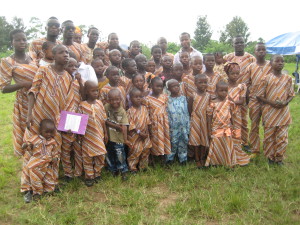Ni igbà àtijọ́, oníyàwó kan kò wọ́pọ̀ nitori iṣẹ́ Àgbẹ̀. Àṣà fi fẹ́ iyàwó púpọ̀ ṣe kókó nitori bibi ọmọ púpọ̀ pàtàki ọmọ ọkùnrin fún irànlọ́wọ́ iṣẹ́-oko. Fi fẹ̀ iyàwó púpọ̀ kò pin si ilẹ̀ Yorùbá tàbi ilẹ̀ Aláwọ̀dúdú nikan, ó wọ́pọ̀ ni ilẹ̀ Aláwọ̀funfun ni ọ̀pọ̀lọpọ̀ ọdún sẹhin ṣùgbọ́n nitori òwò ẹrú àti ẹ̀sin igbàgbọ́ wọn bẹ̀rẹ̀ àṣà fi fẹ iyàwó kan. Lẹhin òwò ẹrú, li lo ẹ̀rọ igbàlódé fún iṣẹ́ oko jẹ ki Aláwọ̀funfun lè dúró pẹ̀lú àṣà fi fẹ́ iyàwó kan.
Ọ̀pọ̀lọpọ̀ ọ̀dọ́ ayé òde òni ti kọ àṣà fi fẹ́ iyàwó púpọ̀ silẹ̀ nitori ẹ̀sìn, ìmọ̀ àti si sá fún rògbòdiyàn ti ó lọ pẹ̀lú iyàwó púpọ̀. Iṣẹ́ Alákọ̀wé kò ṣe fi jogún fún ọmọ nitori iwé-ẹ̀ri àti ipò ti èniyàn dé ni iṣẹ́ Akọ̀wé tàbi iṣẹ́ Ìjọba kò ṣe fi jogún fún ọmọ bi oko. Owó ti ọ̀pọ̀lọpọ̀ Oniṣẹ́-oṣ̀u ngba kò tó lati bọ́ iyàwó kan ki owó oṣù míràn tó wọlé, bẹni kò tó gba ilé nla ti ó lè gba iyàwó púpọ̀ pàtàki ni ilú nla bi Èkó. Àṣà iyàwó púpọ̀ ṣi pọ̀, ni àwọn ilú kékeré tàbi Abúlé laarin àwọn àgbẹ̀ àti àwọn ti kò kàwé.
 Yorùbá ni “Bàbá, bàbá gbogbo ayé”, bi iyàwó kò bá ni iṣẹ́ lati tọ́jú ọmọ wọn, ìṣẹ́ dé, nitori eyi, ọ̀pọ̀lọpọ̀ obinrin Yorùbá ma ntẹpá mọ́ṣẹ́ lati lè tọ́jú ọmọ wọn lai dúró de ọkọ. Ìyà àti ìṣẹ́ ni fún ọmọ púpọ̀ àti àwon iyàwó ọkùnrin ti kò ni iṣẹ́ tàbi eyi ti ó ni iṣẹ́ ti kò wúlò.
Yorùbá ni “Bàbá, bàbá gbogbo ayé”, bi iyàwó kò bá ni iṣẹ́ lati tọ́jú ọmọ wọn, ìṣẹ́ dé, nitori eyi, ọ̀pọ̀lọpọ̀ obinrin Yorùbá ma ntẹpá mọ́ṣẹ́ lati lè tọ́jú ọmọ wọn lai dúró de ọkọ. Ìyà àti ìṣẹ́ ni fún ọmọ púpọ̀ àti àwon iyàwó ọkùnrin ti kò ni iṣẹ́ tàbi eyi ti ó ni iṣẹ́ ti kò wúlò.
Ewu ti ó wà ni ilé oníyàwó púpọ̀ ju ire ibẹ̀ lọ. Yorùbá ni “Oníyàwó kan kò mọ ẹjọ́ oníyàwó púpọ̀ da a”. Lára ewu wọnyi ni, ki i si ifọ̀kànbalẹ̀ nitori ijà àti ariwo ti owú ji jẹ laarin àwọn iyàwó ma nfà pàtàki ni agbo ilé nlá tàbi ilé Ọlọ́rọ̀ àti Olóyè. Ọ̀pọ̀lọpọ̀ ilé oníyàwó púpọ̀ ma nda ahoro lẹhin ikú Olóri ilé nitori kò si ẹni ti ó ni ìfẹ́ tọ si Bàbá oníyàwó púpọ̀.
ENGLISH TRANSLATION
In the olden days, monogamy was not common because of the Agrarian Community. Polygamy culture was important in order to produce many children particularly male children for the purpose of helping in the farm. Polygamy was not limited to the Yoruba culture or Africa, as it was common in the Western world many years ago, but slave trade and adopting Christianity made monogamy possible. After slave trade, invention of farming tools during the industrial age made it easier for the developed world to continue with monogamy.
Many modern youths/young men had rejected polygamy as a result of adopting Christianity, education and avoiding the turmoil associated with polygamy. Children cannot replace their parent’s position in a Blue collar job or use their certificates. Wage/Salaried Workers or Government Employment cannot be inherited as farm land could. The salary that is earned by many workers is not enough to feed a wife before the payment of the next, and cannot also be used to rent a big enough accommodation for many wives particularly in Cities like Lagos. Polygamy is still common in in the smaller towns or villages among farmers and the illiterates.
According to a Yoruba adage, “Father of all”, poverty comes, if a woman in Polygamy has no income to look after her own children. Many Yoruba women work very hard to take care of their children without waiting for the man. Children and wives of a jobless or working irresponsible Polygamist often suffer.
The disadvantage of Polygamy is more than its benefits. Another Yoruba adage said “A Monogamist cannot adjudicate in a Polygamist problem”. Some of the dangers of Polygamy are: lack of peaceful environment as a result of infighting and noise associated with rivalry among the wives particularly in a big compound of the wealthy and Chief’s home. Many Polygamous homes do crumble after the death of the head of the family because no one is committed to a Polygamous father.
Originally posted 2015-07-24 22:19:43. Republished by Blog Post Promoter


